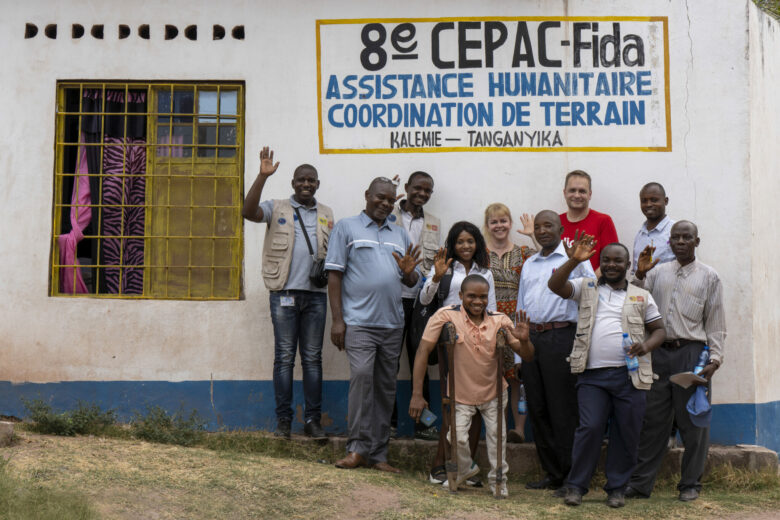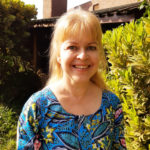The Law requiring proof of physical health makes it harder for people with disabilities to find work in Congo – Strong advocacy work needed for change

In the Democratic Republic of Congo, Fida and the CEPAC advocacy team are working to end laws and practices that discriminate against people with disabilities. In her blog, Katja Köykkä, Special Advisor to the Congo Country Programme, describes the ideas and achievements of the advocacy team so far.
We cannot, under any circumstances, allow such a discriminatory law to exist in our country! This is the cry of Wamu Amundala Jeanpierre, head of the advocacy team of Fida’s partner CEPAC Church in the Democratic Republic of Congo. I have come to meet the team and we are going through the situation in the region and the opportunities and plans for advocacy work together.
Kalemie is a town on the shores of Lake Tanganyika. People living in the area face many challenges in their daily lives. Difficulties in making a living, lack of clean water and prolonged unrest have driven people away from their homes. However, our discussion about the Kalemie area is so full of hope and looking to the future that I am dumbfounded listening to these visibly enthusiastic advocacy team members! This is how they describe the current situation and the work so far:
Before you can start a job, you must provide the employer with a certificate of physical health. This is a paragraph that we definitely want to change. This means that if you have a physical disability, you will never be able to apply for a job, the team goes on to say.
A year and a half ago, we attended our first training course on advocacy and it really opened our eyes. Now our team consists of six members, each with their own responsibilities, such as chairperson, acting as secretary or training coordinator. After the training, we wanted to find out more about how children’s rights are implemented in our region and whether all children have the same opportunities to go to school.
We realised that we can work for people with disabilities, but the best thing is to do it with them
We started by talking to and training teachers and school leaders. We highlighted that Congolese law supports every child’s access to school, but that this is not reflected in everyday life. We also decided to go a step further – to where decisions are made, to where the power to make change lies. We spoke to a local representative of the Ministry of Education about the situation and got their support.
After all this work, the situation in Kalemie has improved. Access to school for children with disabilities has been made easier, mainly because teachers have improved know-how in inclusive education. Gradually, the taboo around the subject is also beginning to be dissipate. On the other hand, parents also now have a better understanding that every child has the right to go to school.
Very soon after setting up our team, we realised that we can certainly work for people with disabilities, but the best thing is to do it with them. For this reason, we have an experienced expert in the team who also acts as a liaison with the Disability Committee in the region. This also gives us a strong voice from those whose rights we want to promote and defend.
Advocacy work needs strong facts to be taken to those who make decisions about our country
We have already achieved a lot of positive change through advocacy work. The change must come from here, from us, the people in the villages. We need to know what the situation is in order to get the message across to decision-makers who are often far removed from people’s daily lives – especially those whose rights are being trampled on.
Our challenge at the moment is that we do not yet have enough statistics to fully describe the situation of people with disabilities in the region and the factors that limit their lives and their inclusion. This is what we are now working towards. Advocacy work needs strong facts to take to those who make decisions about our country. We cannot just talk about what we think.
We cooperate with our country’s Minister for Disability Affairs. We have told him about our work, and we have taken the message boldly about what needs to change to make human rights a reality for everyone in our region.
It is said that if you save one, you save the whole world
One of the highlights of our work has been when we got to speak on television. This was a tremendous opportunity to get our voice and our message heard throughout the country. We spoke about children’s right to education, and that we cannot allow discrimination – everyone is needed to build a better future!
One day we heard about a girl whose parents had died and she was living on the support and help of people. She has a disability and therefore, was not accepted to go to school. We had a discussion with the local school board and now the girl is in school. We are helping her with school materials and a school uniform. It is said that if you save one, you save the whole world. Through advocacy, we help individuals, our fellow human beings. One day, you too may find yourself in a situation where you hope to see justice done. Although we work hard to influence decision-makers, we do not want to turn a blind eye to the concerns of individuals.
We will continue to make a difference! That is why we have now taken it upon ourselves to lobby for a change in the law to allow people with disabilities to apply for work without a certificate of physical health, provided that the job is suitable for them. We have already been in contact with the Parliament, the Senate, the Prime Minister and the Ministry of Social Affairs to ask for a change in the law. We look forward to their response and we will not give up!
Blog author: The author Katja Köykkä is a special advisor to the Congo DT Country Programme. Working in a fragile country, she is inspired by people’s stories and the power of community. More than advice, she has questions through which she reflects on life together with Congolese people.

